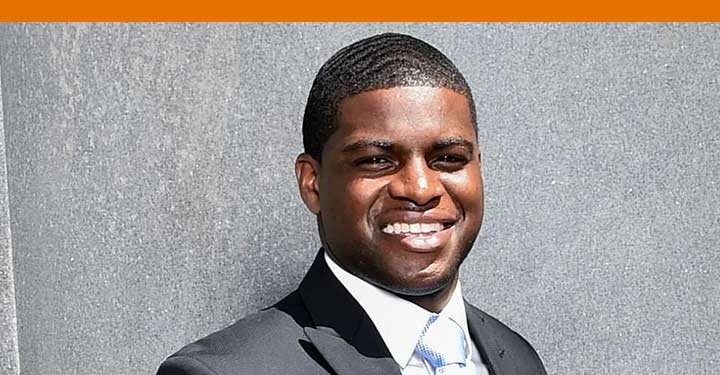IROnline Alumni Profile: James Anderson

Meet James Anderson—Fulbright Scholar, Truman National Security Fellow, and Air Force veteran who served during Operation Enduring Freedom. In nine short years, this Air Force intelligence officer has amassed impressive credentials and experience.
Tell us about your background. What is your current job title and responsibilities?
I enlisted in the active-duty United States Air Force 11 years ago after high school, serving in maintenance and logistics. I am currently a captain in the United States Air Force, serving as a staff intelligence officer with the United States Air Forces Central Command at Shaw Air Force Base in South Carolina.
As the chief of collection management, my role consists of managing the intelligence requirements for airborne assets, integrating emerging sensor technologies, and theater collection planning. But most importantly, I serve as the “belly button” for the intelligence directorate, interfacing with customer agencies, external partners, and subordinate organizations. I also serve as a Next Generation National Security Fellow with the Center for a New American Security.
Did you serve while enrolled in the program? Why did you choose MAIR?
Yes … I spent a lot of long nights reading, studying, and writing during my six-month training course and first year at my assignment in Virginia. It was challenging, but the program found a way to distinguish itself from traditional online courses that depend largely on discussion boards and self-study. Instead the MAIR program allowed for students to develop relationships with professors and instructors through the online platform, in addition to instituting collaborative assignments, which encouraged relationship-building within my cohort. Make no mistake, it is a challenging program—but that is what I expected from the AU SIS brand.
I was attracted to the program due to the steps AU made toward creating a hybrid distance learning program for a graduate degree in international relations. AU seemed far ahead of other top-tier schools that specialize in IR. After speaking with two student advisors (I still remember their names), I was sold. I knew this would be a great fit for me even considering the tough road ahead for me adjusting back to active-duty life.
How did you balance this program with your career and personal life?
It was very tough between career and family; a lot of long nights were spent catching up on papers and conducting research. Bottom-line, though—it was all worth it. I commend the support staff of the MAIR program, because without their consistent course planning and advisement, it would have been a challenge for me to stay on track. I had a person always ready to walk me through all the processes—whether it was using the virtual tools or accessing my veterans affairs benefits. She was an absolute rock star! The support teams made sure my classes were scheduled, discussed some of my professional goals, and constantly asked for feedback with regards to programming efforts.
How does this degree fit into your career plan?
It set the foundation for my work inside and outside of the Air Force. I often joke that Dr. Bensahel and (ret.) Gen. Dave Barno’s three-day course on military culture taught me more about Air Force culture than my time in uniform. The many courses that centered on the history of U.S. foreign policy, defense policymaking, and strategic culture have provided me with advantages as a junior officer. AU provided a foundational strategic understanding of issues that I would have to engage with at the tactical level. Not to mention, I solely credit AU with instilling the foundation for my Fulbright scholarship.
Did your experience in the program help you prepare for your Fulbright fellowship?
The Fulbright program provides grants for students, academics, and practitioners to carry out research projects across the globe annually. I had the opportunity to spend one year in Canada. I conducted research as a master’s student at Queen’s University, writer for Conversation Canada, and Visiting Fulbright Fellow at the Centre for International and Defense Policy in Kingston, Ontario. My research centered on a historical inquiry into the development of Canada-U.S. relations to better understand the future of Canada-China relations against the backdrop of a rising China. During my Fulbright year, I produced two op-eds picked up by Global News, National Post, and MSN, among others, and am currently editing a journal article for publication titled “A Wedged Middle Power: Canada’s Role Amid China’s Rise.”
The MAIR program helped in two ways: First, my initial proposal for my Fulbright centered on strategic culture, a concept that I learned in my course called Security from Inside the State, taught by Professor Sharon Weiner, and Dr. deRaismes Combes was my instructor. I proposed to examine the shift in Canadian national security strategic culture resulting from the election of Donald Trump, but ultimately opted for something much more research-worthy. Secondly, Dr. Combes was my recommender for grad school at Queen’s University—she is awesome!
What connections did you make while enrolled in the program?
Many connections! I have met up with many friends that I made in the program. The social events are an essential aspect of the program and provide a significant amount of time to interface on a personal and professional level with my cohort. We were very close during my time in the program. We mostly keep in contact on LinkedIn and chat or meet up in D.C.
Pursue Your Goals
Request more information about International Relations Online.
Learn More

